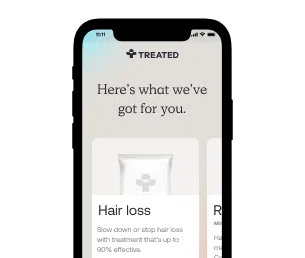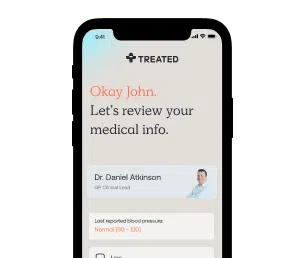Sore throat
Sprays to soothe a painful throat.
Secure delivery
UK clinicians
A sore throat is a dry uncomfortable feeling in your throat, usually caused by a viral infection. It often clears up after a few days, but it can be painful.
Order sore throat treatment online with Treated to get proven relief for your symptoms, so you can get back on track.
A sore throat is often a symptom of another condition, like a cold or the flu. It’s characterised by, like the name suggests, having a sore (painful) throat. Your symptoms might include dryness, difficulty speaking or swallowing, or swollen neck glands.
You can often treat it yourself at home, just by taking measures to lessen the irritation, like gargling water, drinking warm, soothing drinks and staying in a warm, moist environment. If your symptoms are particularly unpleasant, linger for a long time or your sore throat is caused by a bacterial infection, then your clinician might recommend treatment with medicines.
Sore throat can affect anyone, but it’s been shown to often affect people in certain professions who strain their throat more frequently, such as teachers, or people who are exposed to smoke or irritants, like firefighters.
You’ll be at a greater risk of developing a sore throat if you smoke, as well.
Sore throat is extremely common. There isn’t a great deal of data to show just how common it is, but you’ve likely suffered from it yourself at least once, or know someone who has. It’s a common symptom of routine conditions like colds, or it might happen to you if you’ve shouted or sung too strenuously (after a concert, for example).

How we source info.
When we present you with stats, data, opinion or a consensus, we’ll tell you where this came from. And we’ll only present data as clinically reliable if it’s come from a reputable source, such as a state or government-funded health body, a peer-reviewed medical journal, or a recognised analytics or data body. Read more in our editorial policy.
Viruses account for around 90% of sore throats. Aside from cold or flu, it can be caused by other viruses, like measles, chicken pox and mumps. The other 10% of the time, it can be caused by:
On rare occasions, sore throat can be caused by a tumor, indicating throat cancer. If your sore throat has remained for more than a week, doesn’t seem to be going away and is making it difficult for you to swallow, then you should make an in-person appointment with a clinician so that they can examine you.
As the name suggests, the primary symptom of a sore throat is pain in your throat. It might also give you trouble swallowing, bad breath, swollen neck glands, redness in the back of your mouth and a mild cough.
If you have severe symptoms, like difficulty breathing, drooling, or you’re making a high pitched sound when you breathe, you should seek immediate medical attention.
A sore throat won’t usually lead to any other problems, but on rare occasions a sore throat can be a sign of a more serious condition, so make sure you see your clinician if it’s not going away after a week or you have troubling symptoms.
It might also cause you some issues if you are ‘immunosuppressed’ (have a weakened immune system), so you should also contact a clinician for advice if you have HIV, or are undergoing treatment that weakens your immune system like chemotherapy.

How we source info.
When we present you with stats, data, opinion or a consensus, we’ll tell you where this came from. And we’ll only present data as clinically reliable if it’s come from a reputable source, such as a state or government-funded health body, a peer-reviewed medical journal, or a recognised analytics or data body. Read more in our editorial policy.
You can often get treatments for sore throat over the counter. You might want to take painkillers like paracetamol or ibuprofen to help you with the pain and discomfort until your symptoms stop. You can also take lozenges that have some medicine in them, which will work to numb or reduce inflammation in your throat. There are also sprays you can use such as Benzydamine (also known under the brand name Difflam), which will work to reduce pain and swelling.
If you have strep throat, which is caused by a bacterial infection, then there’s a chance that you’ll be prescribed antibiotics to help with this, but there isn’t a great deal of evidence to show that they always help. Usually, like a normal sore throat, strep throat clears itself up within a week, so it’s normally recommended that you ‘wait out’ the symptoms before taking antibiotics to see if it goes away on its own. This is because antibiotics can cause some unpleasant side effects, and if they’re used incorrectly it can lead to antibiotic resistance. GPs see patients fairly regularly about sore throats but rarely prescribe antibiotics for it these days, a recent research paper indicates that when they are prescribed, antibiotics only shorten the duration of symptoms by about 16 hours.
The ‘best’ treatment for sore throat often depends on personal preference. Some people find that they can manage their symptoms simply by avoiding irritants like smoke, or by sucking on ice cubes, lollies and sweets to moisturise their throat. Whereas other people might prefer to use anti-inflammatory medicines and painkillers.
If you’re suffering with strep throat then your clinician might decide that antibiotics could be the best option, though more often than not you’ll be able to treat your symptoms with the same methods as you would with a regular sore throat.
Most of the time, a sore throat doesn’t need to be treated. Usually it’s nothing to worry about, and will go away within a week. If you’re finding your symptoms are uncomfortable, you can take some treatments to reduce their severity.
You should seek medical advice for your sore throat if you’re still suffering with it for more than a week. It might be a sign of a more serious condition.

How we source info.
When we present you with stats, data, opinion or a consensus, we’ll tell you where this came from. And we’ll only present data as clinically reliable if it’s come from a reputable source, such as a state or government-funded health body, a peer-reviewed medical journal, or a recognised analytics or data body. Read more in our editorial policy.
Have something specific you want to know? Search our info below, or ask our experts a question if you can’t find what you’re looking for.
Environmental and non-infectious factors in the aetiology of pharyngitis (sore throat). Inflammation Research, 61(10), pp.1041–1052.
Rapid Antigen Group A Streptococcus Test to Diagnose Pharyngitis: A Systematic Review and Meta-Analysis. PLoS ONE, 9(11).
Acute sore throat. Canadian family physician Medecin de famille canadien, [online] 57(7), pp.791–4.
Use of antibiotics for acute sore throat and tonsillitis in primary care. British Journal of General Practice, [online] 72(716), pp.136–137.

Non-steroidal anti-inflammatory spray that tackles sore throat and tonsillitis symptoms.

Like Difflam but cheaper. Antibiotic-free treatment for sore throat and tonsillitis.

Registered with GMC (No. 4624794)
Meet Daniel
Registered with GPhC (No. 2202465)
Meet Sanjeda
Registered with GPhC (No. 2070724)
Meet Craig
Always read the leaflet that comes with your medication and tell us about any side effects you get.
We know health, but you know you.
Our experts tell you what’s safe, but you decide what’s best.
Answer a few questions and tell us about yourself. Get tailored advice from our clinicians so you can choose better.

Choose your treatment and how often you have it delivered.

We know things change. It’s the nature of life. We’ll check in regularly to make sure your treatment is still right for you.
Pause. Change. Skip. Start again. Any time you like.
Here are some other things we can help with.
Choose from our range of tablets and solutions. Get ongoing care and support from our experts.
Stop smoking treatments that can help you kick the habit forever, and reduce your risk of disease.
Tablets or injections. Tailored weight loss treatments combined with ongoing support from our experts.
We're making healthcare more about you. Sign up to our newsletter for personalised health articles that make a difference.
Disclaimer: The information provided on this page is not a substitute for professional medical advice, diagnosis, or treatment. If you have any questions or concerns about your health, please talk to a doctor.
We couldn't find what you're looking for.
Here's everything we treat. Or, if you're looking for something we don't have yet, you can suggest something.
If there’s a particular treatment or condition you’re looking for, tell us and we’ll look into it for you.
Submit your question here, or tell us if you’ve found an issue on our site.
We’ll get back to you very soon. We aim to respond to all queries in one working day.
You’re signed up to our newsletter. Keep an eye on your inbox for our latest update.
By clicking 'Subscribe now' you're agreeing to our Privacy Policy.
We’ve sent you an email asking you to confirm your email address.